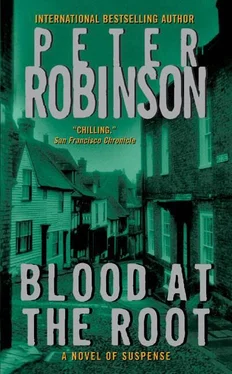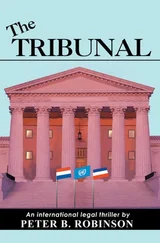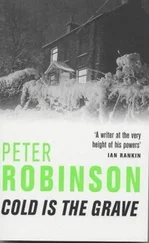But Banks didn’t trust himself not to screw something up if he started messing around with that, so he made a note to get someone else in to give it the once-over.
Back in the hall, Banks could only marvel at the sheer emptiness of the place. There was no personality. You’d expect, if Jason was a member of a white power organization, at least a few Skrewdriver CDs and maybe one or two copies of The Order strewn around the place. But it was as if someone had been there and stripped away all signs of character, if there had been any. And maybe someone had.
Two men, Liza Williams had said, and they had left with some cardboard boxes. Unfortunately, it had been raining in Leeds that Sunday morning, and they had both been wearing flat caps. Black or navy blue. One of them wore a black leather jacket and jeans, the other a donkey jacket. The one in the leather jacket was taller than the other.
No, Liza admitted, they weren’t particularly well dressed, but then she watched a lot of police programs on telly, so she didn’t expect real policemen to be any better dressed than their fictional counterparts. No, she couldn’t say how old they were, hadn’t seen their faces, but she got the impression by the way they moved that they were probably fairly young and fit.
And that was about all she could say, she was sorry. She had, after all, only glimpsed them, and as she noticed they used a key to get in, she didn’t worry about them being burglars or rapists. She first thought they were friends of Jason’s – he sometimes had friends to stay – and then, after she heard of his death, she just assumed they’d been policemen come to return his belongings to his family or something. No, her husband hadn’t seen them; he had already settled down with the Sunday papers, and once he did that…
The only thing she had noticed was a blue car parked outside, which she thought belonged to the men. But she didn’t know what make it was, let alone the number. She did say it was clean, though.
Banks sighed as he closed the door behind him. He would have to get someone from West Yorkshire to fix the pane of glass he’d broken, and perhaps to question some of the other people in the street. Whatever they’d noticed, it had to be more than Liza Williams had.
By mid-afternoon, Susan was wet, tired and no further ahead than she had been in the morning. The Nazurs and the Mahmoods had been sullen and uncommunicative, as expected, and she had flinched at the clear accusations of racism in their eyes. No, Jason Fox had never been in the Mahmoods’ shop, as far as they knew, and the Nazurs had never seen him in their restaurant. And they knew nothing about any Albion League.
Sergeant Hatchley was still out pounding the streets, so at least she got the opportunity to warm herself up with a cup of coffee and take a little quiet time for herself.
She had just put her cold wet feet on the radiator to warm them when one of the staff from the murder room came in bearing a fax. “Just arrived,” he said.
Susan thanked him and looked at the single sheet. All it said was:
THE ALBION LEAGUE
along with a telephone number. A London number.
Curious, Susan picked up the phone and dialed. She remembered that Banks had faxed a request for information about the Albion League to Scotland Yard, so she wasn’t surprised when someone there answered. After a bit of shuttling around and a lot of waiting, she finally got to someone who knew what she was talking about when she mentioned the Albion League. His name, he said, was Crawley.
“Is your boss there, love?” he asked.
Susan bristled, gripping the receiver tightly, but she said nothing.
“Well?” Crawley repeated.
“I’m afraid Detective Superintendent Gristhorpe is out of the office at the moment,” Susan finally managed between gritted teeth.
“And you’re DC Gay?”
“Yes.” At least he didn’t make any cracks about her name.
“I suppose you’ll have to do then.”
Not her day. “Thanks a lot,” she said.
“Don’t take offense, love.”
“I’ll try not to, sweetie pie. Now how about the Albion League?”
She heard Crawley laugh at the end of the line, then he cleared his throat. “Yeah, well, it’s a neo-Nazi organization, white power. That’s why we’re interested, see, in why you want to know.”
“I’d have thought it was a simple enough inquiry,” Susan said.
“True enough, love, but nothing to do with those bastards is simple. They’re flagged.”
“Flagged?”
“Any time their name comes up, certain people have to be informed.”
“That sounds very mysterious.”
“Does it?”
“Yes. Anyway, don’t worry. I’m sure DCI Banks will send you a full report – he’s heading the field investigation – but would you mind, just for the moment, humoring a poor DC? Could you give me some general idea of what this particular neo-Nazi organization is all about, what they want?”
She heard another brief chuckle down the line, then Crawley said, “Want? That’s easy. Same as all the rest of them, really. The usual things. Racial purity. Repatriation of immigrants and all ethnics. Keep Britain white. Oh, and they want the trains to run on time, too.”
“Some hope of that.”
“Tell me about it. Seriously, though, love, it’s not so much what these people want – that’s usually predictable enough – but what they’re willing to do to get it – what means they’ll use, how they’re organized, what connections they have with other groups, whether they’re armed, what international links they have, if any. That sort of thing. See what I mean?”
“Yes,” said Susan. “And the Albion League, how do they fit into all that?”
There was a pause. Then Crawley said, “I’m sorry, but I’m really not authorized to tell you any more than that. Have your boss give me a bell when he comes in, will you, love?”
And the line went dead.
By the time Banks had finished coordinating with West Yorkshire police, it was late afternoon. He decided to drop by Tracy’s residence and see what she was up to. She had only been at the University of Leeds for a little over two weeks, but already he missed her. Maybe he could take her for a spot of dinner or something. That way he would also avoid the rush-hour traffic on the way home.
And spending time with Tracy might also make him forget about his problems with Sandra for a short while.
When he got to the student residence building beside Woodhouse Moor, he was pleased to find that not just anyone could walk in. You had to know whom you wanted to see. Banks found a porter on duty, showed his identification and said he’d like to visit his daughter.
Impressed with Banks’s credentials, the garrulous porter – who said he had been a policeman himself some years ago, before a leg injury forced him to retire – let him in.
As Banks walked up the two flights of stairs, he wondered if he should have announced himself first. What if Tracy was with a boy or something? Having sex? But he dismissed the idea. He couldn’t imagine his daughter doing that. Either she’d be out at a lecture, or she’d be studying in her room.
When he got to her door, he knocked. He could hear music from down the hall, but not a sound from Tracy’s room itself. He knocked again, more loudly this time. Nothing. He felt disappointed. She must be at a lecture.
Just as he was about to walk away, the adjacent door opened and a young tousle-haired girl stuck her head out. “Oh, sorry,” she said in a husky voice. “I thought you were knocking on my door. Sometimes you can’t tell, if you’ve got some music on or something.” Then her eyes twinkled. “Hey, you weren’t knocking at my door, were you?”
Читать дальше












